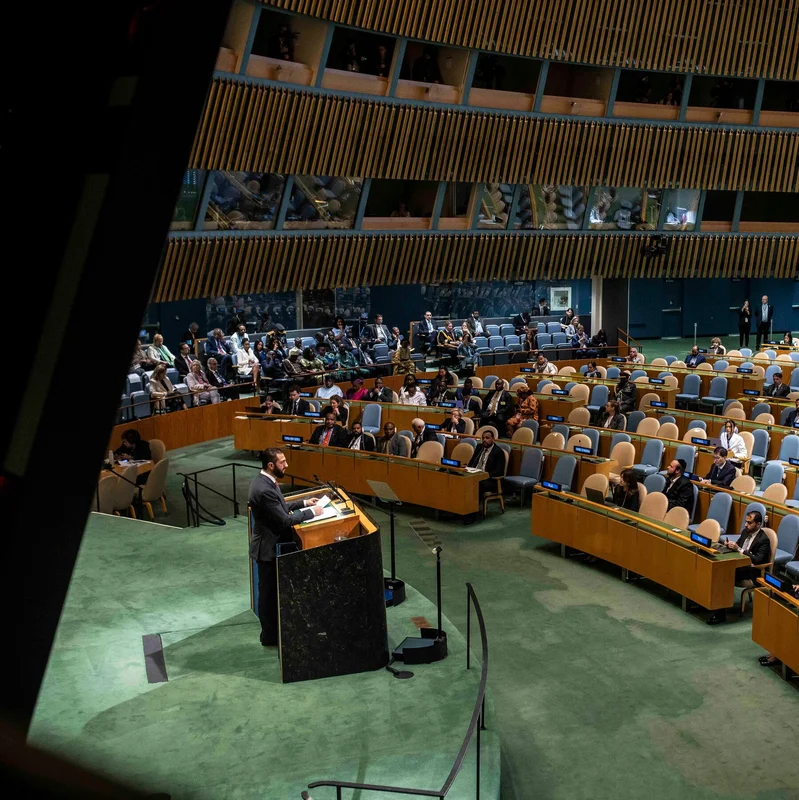In a historic address to the United Nations General Assembly on September 24, 2025, Syrian President Ahmed al-Shara declared that his war-torn nation has transformed from “an exporter of crisis” into “an opportunity for peace”—marking the first time a Syrian leader has spoken at the U.N. since 1967.
Al-Shara, a former rebel commander who led the coalition that ousted Bashar al-Assad in December 2024, used his eight-minute speech to rebrand Syria on the global stage. His appearance signals a dramatic geopolitical shift in a country once synonymous with civil war, refugee flows, and chemical weapons.
From Rebel Leader to Global Diplomat
Al-Shara’s journey to the U.N. podium is as unconventional as it is controversial. Once affiliated with Al Qaeda-linked factions during Syria’s 13-year civil war, he is still officially designated a terrorist by both the United States and the United Nations. Yet his government now controls Damascus and claims to have stabilized the country after toppling the Assad regime.
“Syria has transformed from an exporter of crisis to an opportunity for peace—for Syria and the region,” al-Shara told the General Assembly, drawing cheers from crowds watching his speech on giant screens in city squares across Syria.
Key Reforms Cited by the New Syrian Government
- ✅ Refugee return program: Opened borders for over 500,000 displaced Syrians
- ✅ Drug crackdown: Shut down major captagon production networks
- ✅ Chemical weapons cooperation: Re-engaged with international inspectors
- ✅ Dialogue with Israel: Called for revival of 1974 disengagement agreement
Why This Matters to North America
While Syria may seem distant, its transformation has real implications for U.S. and Canadian foreign policy, security, and humanitarian interests:
- 🌍 Counterterrorism recalibration: If al-Shara’s government stabilizes Syria, it could reduce safe havens for extremist groups that threaten global security.
- 🛃 Refugee policy shifts: A stable Syria may ease pressure on Western asylum systems—but only if return is voluntary and safe.
- ⚖️ Sanctions dilemma: The U.S. currently maintains sweeping sanctions under the Caesar Act. Al-Shara urged their removal, calling them “collective punishment.”
- 🕊️ Middle East realignment: Syria’s outreach to Israel and Gulf states could reshape regional alliances—with or without U.S. involvement.
Syria’s Diplomatic Timeline: 2024–2025
| Date | Milestone |
|---|---|
| Dec 2024 | Al-Shara’s coalition captures Damascus; Assad flees to Russia |
| Mar 2025 | Syria cracks down on captagon labs; seizes $2B in assets |
| Jun 2025 | Secret talks with Israel begin over Golan Heights buffer zone |
| Sep 24, 2025 | Al-Shara addresses U.N. General Assembly—first Syrian leader since 1967 |
Skepticism and Challenges Ahead
Despite al-Shara’s optimistic framing, experts urge caution. “Rhetoric is not reality,” said Dr. Nadim Shehadi, Middle East scholar at Chatham House. “The international community will need to see verifiable actions—not just speeches—before lifting sanctions or normalizing ties.”
Key concerns include:
- ❓ Human rights record of al-Shara’s former militias
- ❓ Fate of political prisoners from the Assad era
- ❓ Ongoing Israeli airstrikes in southern Syria
- ❓ Continued U.S. and U.N. terrorist designation
Notably, Israel confirmed that “negotiations are taking place with Syria,” though it insists on “demilitarization of southwestern Syria” as a precondition for peace.
What’s Next for U.S.-Syria Relations?
🔮 Three Possible Scenarios
- Status Quo: U.S. maintains sanctions; Syria seeks partnerships with China, Russia, and Gulf states.
- Conditional Engagement: U.S. offers limited aid in exchange for chemical weapons transparency and anti-drug cooperation.
- Diplomatic Thaw: If al-Shara holds elections and reforms security forces, normalization could begin by 2027.
For deeper analysis of post-Assad governance, see [INTERNAL_LINK:syria-political-transition-2025].
For authoritative updates on global conflict and diplomacy, visit the United Nations Official Website.




